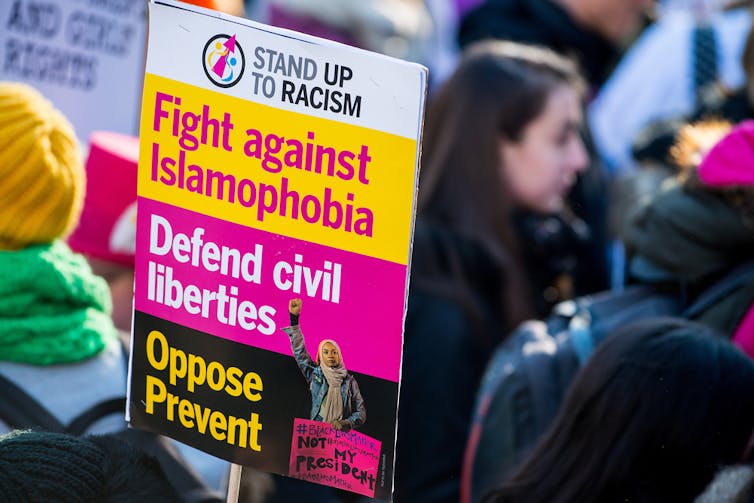
John Gomez/Shutterstock
Chris Allen, University of Leicester
The All Party Parliamentary Group (APPG) on British Muslims has made history by putting forward the first working definition of Islamophobia in the UK. Its report, Islamophobia Defined, states:
Islamophobia is rooted in racism and is a type of racism that targets expressions of Muslimness or perceived Muslimness.
The culmination of almost two years of consultation and evidence gathering, the definition takes into account the views of different organisations, politicians, faith leaders, academics and communities from across the country. It also takes into account the views of victims of hate crime.
Islamophobia is still a relatively new word which entered the public and political lexicon little more than two decades ago. Yet, the process of establishing a working definition of Islamophobia has been ongoing and one that I have contributed to in various different ways.
In the hope of bringing about a more consistent and coherent approach to tackling Islamophobia, the drive for a working definition has been underpinned both by the need to help people better understand what Islamophobia is and isn’t, and also to record levels of Islamophobic hate crime.
For detractors however, Islamophobia is a problem for a number of reasons. Some, such as the writer Melanie Philips claim that Islamophobia just does not exist, that it is a mere “fiction”. Yet data on hate crimes against Muslims from the Metropolitan Police and Tell MAMA among others render such claims wholly unfounded.
Others such as the Quilliam Foundation find the term problematic, suggesting that it shuts down debate. At the most extreme, commentators such as Rod Liddle claim there just isn’t enough Islamophobia.
Comparisons with racism
Irrespective of whether the new working definition of Islamophobia has the potential to counter these narratives, it has much to offer. Short and accessible, the new definition is neither too complex nor overly academic, which maximises its potential appeal to both public and political audiences.
 Celebrating Eid at Leeds Grand Mosque in Yorkshire. Danny Lawson/PA Archive
Celebrating Eid at Leeds Grand Mosque in Yorkshire. Danny Lawson/PA Archive
Aligning Islamophobia with racism is also likely to be helpful, because people intuitively “get” racism, and the majority deem it to be unwanted and unnecessary in today’s Britain. The same needs to be true for Islamophobia where people “get” that a Muslim woman being physically assaulted is equally unwanted and unnecessary.
Drawing comparisons with racism does have the potential for some confusion, not least in conflating religion with “race”. While religion has the potential to be changed and chosen, race is largely fixed and unchanging. This means it will be important to explain clearly that the comparison with racism is made to highlight similarities between the functions and processes of Islamophobia, rather than suggesting Muslims constitute a race. In this way, the new definition emphasises how Islamophobia targets markers of “Muslimness” and Muslim identity – evident in how perpetrators of Islamophobic hate crime disproportionately target visibly Muslim women – in the same way that racism often targets people for the colour of their skin.
Read more:
What does Islamophobia feel like? We dressed visibly as Muslims for a month to find out
Given the new definition’s emphasis on Muslimness and Muslims, this should go some way to allaying fears that it’s Islamophobic to not share the same beliefs as Muslims or disagree with some of their practices. Clearly it is not. Nor is it Islamophobic to appropriately criticise Muslims or condemn atrocities committed by any group or person who might claim to be acting in “the name of Allah” (or similar). But, as the new definition rightfully infers, if disagreements, criticisms or condemnations are used to demonise or vilify all Muslims without differentiation, then it’s likely at least some Islamophobic views will be underpinning such an approach.
The new working definition goes beyond merely replicating the working definition of antisemitism that was put forward by the International Holocaust Remembrance Alliance before being adopted by the British government in 2016. While I’ve previously advocated substituting Islamophobia for antisemitism as a quick and easy solution to the ongoing definition problem, the complexity and fallout from recent allegations of antisemitism in the Labour Party highlight the weaknesses and deficiencies of such an approach. Having two separate definitions for Islamophobia and antisemitism ensures that critical – and necessary – distance between the two phenomena is maintained.
What people do and say
While the working definition is a welcome development, it’s worth remembering that it is only a recommendation. Whether the government intends to adopt it or not is unclear at this stage.
As a catalyst for change, however, the definition is right to be more concerned with what people do and what they say, rather than laying claim to what or who they are. Using the definition to merely call out potential Islamophobes has the very real potential to be wholly counter-productive. Instead, it must be used to build new constituencies and alliances that can work together to advocate for change.
While the working definition is unlikely to appease those who ultimately deny Islamophobia’s existence, if it draws attention to Islamophobia and its negative consequences, that can only be a good thing. My hope is that it will also draw attention to how Islamophobia impacts the lives of many ordinary Muslims going about their lives in today’s Britain. This should neither be dismissed nor underestimated.![]()
Chris Allen, Associate Professor in Hate Studies, University of Leicester
This article is republished from The Conversation under a Creative Commons license. Read the original article.




18 Comments
Pingback: พัดลมหลังคา
Pingback: look here
Pingback: รับสมัครตัวแทนประกันรถยนต์
Pingback: https://vhnbio.com
Pingback: เว็บพนันเกาหลี
Pingback: เครดิตฟรี 50 ยืนยันเบอร์ ดียังไง
Pingback: ไม้เทียม
Pingback: เสื้อช็อป
Pingback: Food Recipes
Pingback: cinemakick
Pingback: TAISHAN
Pingback: dark168
Pingback: โคมโรงงาน
Pingback: ezybet88
Pingback: pg168
Pingback: lovecasino
Pingback: อุปกรณ์กายภาพบำบัด
Pingback: ร้านเค้กวันเกิดใกล้ฉัน